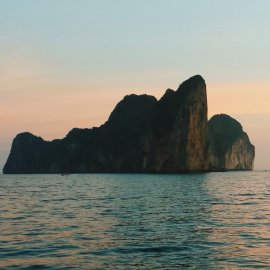Stakeholders of Nature
-
English
-
ListenPause
[intro music]
Welcome to World Ocean Radio…
I’m Peter Neill, Director of the World Ocean Observatory.
The word “stakeholder” has long been used to indicate a certain relationship between business and investment. It was apparently first used in the 18th century referring to individuals who held money during financial transactions or bets – funds held by an independent party in a kind of escrow until the outcome was known of a transaction or wager. It is a word today that has evolved into a more clear definition of ownership, a share in a company doing business that has been capitalized through the sale and distribution of fragments of ownership that can be aggregated into influence over policy and management, bought and sold in markets, and used to reward additional investors or successful executives in lieu of salary. There is a clear shift in relationship in this evolution of meaning, from a neutral party to a participant with expectation of return on investment through interest, dividends, or appreciated value.
The word is ubiquitous today in the policy community, referring to individuals, social groups, or greater collectives with an interest in the need for or outcome of a government or community policy that affects individual rights, health, security, and well being of those governed. It seems more and more amorphous through over-use, a cliché by which any interest whatsoever can be described without undue specificity. We are all stakeholders in something that enables or disables our interests dependent on the time, place, and details.
While the term is used constantly by the environmental community, it is viewed with some suspicion because of its capitalist-related connotation and with some confusion by its imprecision in the context of human, species or terrestrial interest which are often in conflict despite all efforts to combine them into some kind of amalgam of social interest and Nature. It also seems an overly mechanistic or transactional relationship that precludes more emotional and humanistic value questions, psychological and philosophical considerations as viable inclusion in the discussion.
How, then, do we describe the relationship between human society and Nature? Aldo Leopold in “The Upshot,” one of the four seminal essays published in “Sand County Almanac” in 1949, refers to ‘the land ethic’ that disconnects the relationship from property and ownership, and relates the interaction from competition to integration, a kind of natural and social symbiosis in which humanity, as a composite of individuals, is one of several interdependent parts that “simply enlarges the boundaries of the community to include soils, water, plants, and animals, or collectively, the land.” For our purposes here, let make sure that those boundaries are not delimited by land only, and certainly include the sea.
Leopold suggests a “consciousness” that incorporates human behaviors and natural systems that binds our selves and souls, our outer and inner lives together with all natural things and forms a kind of ecological continuum in which all things are connected and inter-related in harmony. It was not a new concept by any means; the idea had been discussed by philosophers and theologians since the Greeks and lived by indigenous people forever longer. But Leopold’s simple statement provided a foundation on which the discipline of ecology emerged to “combine life processes, interactions, and adaptations, the movement of materials and energy through living communities, the successional development of ecosystem, and the abundance and distribution of organisms and biodiversity in the context of the environment.” Seventy years ago, it was a galvanizing idea that focused the modern environmental movement.
It might be still, but for our compulsion to measure and define and organize things in numbers and words, to calculate value in data or dollars, in policies and laws as a practical application of the perspective that for all the progress in science and research has not settled the matter once and for all. The denial of climate change today is the most relevant example – the overwhelming consensus of scientists countered by oppositional, often irrelevant statistics and arguments that question certainty and subvert any response.
This contradiction is inherent in the use of the word ‘stakeholders’. The parties are confused by the notion of property and ownership, science being used in the war between vested interests exclusively opposed to change and those looking inclusively to adapt to changing circumstance and invent a future. There is no sense of shared understanding or participatory engagement in this exchange; it is not a conversation at all. If we are to find out way forward, we will need to change this vocabulary, restore ecological connection as a newly articulated framework for action, and assert creative methods for collaboration, integration, and sustainable regeneration in our partnership with the natural world.
There is so much at stake.
We will discuss these issues, and more, in future editions of World Ocean Radio.
[outro music]
How do we describe the relationship between human society and nature? This week on World Ocean Radio we discuss what it means to be a stakeholder, and how the word itself has evolved from one of business, ownership and investment to that the larger context of environmentalism and ecological connection. We argue that we must understand the interactions between humanity and natural systems, using collaboration, partnership and integration if we are to invent a new way forward toward a sustainable future.
Do you prefer the written word? Head on over to Medium.com/@TheW2O.
About World Ocean Radio
World Ocean Radio is a weekly series of five-minute audio essays available for syndicated use at no cost by college and community radio stations worldwide. Peter Neill, Director of the World Ocean Observatory and host of World Ocean Radio, provides coverage of a broad spectrum of ocean issues from science and education to advocacy and exemplary projects.
Image Credit
Ko Phi Phi, Thailand courtesy of Reiseuhu
- Login to post comments



